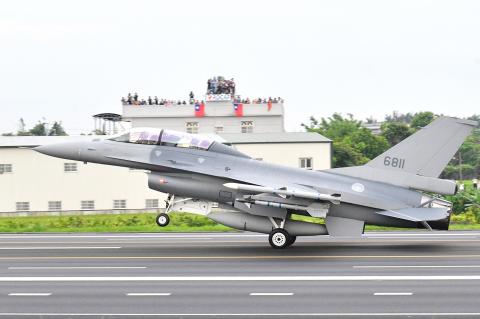US President Donald Trump’s administration is moving forward with a US$8 billion arms sale to Taiwan of Lockheed Martin F-16 jets despite Beijing’s protests, the Washington Post reported yesterday, citing an anonymous official and other sources familiar with the matter.
The US Department of State notified the US Congress late on Thursday that it would submit the deal to lawmakers for an informal review, the Post said, before calling the potential deal “the largest and most significant sale of weaponry” to Taiwan in years.
The decision came amid stalling trade talks and rising tensions between the US and China, the report said.

Photo: Sam Yeh / AFP
Lawmakers from the Democratic and Republican parties had raised concerns that Trump could scuttle the arms sale to assist ongoing trade negotiations with Beijing or use it as a bargaining chip, the report said.
In response, Air Force Command said on Facebook yesterday that the Republic of China Air Force would increase its number of tactical fighter wings from seven to eight after receiving the upgraded F-16C/D Block 70 aircraft.
Establishing a new tactical fighter wing is part of the air force’s plan to grow the service, which would see the most significant increase in the strength of the air force in 20 years, the command said.
Should the project be implemented as planned, the air force would attain its goal of having volunteers comprise 90 percent of its personnel, it said.
The air force’s fleet of third-generation fighter aircraft have reached the middle of their service life and urgently need to be replaced due to increasing military threats and future requirements, the command said.
The F-16C/D Block 70 aircraft, or F-16 jets that have been upgraded to the F-16V standard, would be equipped with advanced avionics, possess enhanced capabilities for firing beyond-visual-range missiles, and require short takeoff and landing distances, the command said.
Procuring upgraded F-16s would mean that pilots could be trained faster, as the aircraft would be similar to what they are used to and would provide logistics and maintenance benefits, it said.
The air force has been asking the US for upgraded jets since 2008 and has not received positive feedback until now, it said, adding that the proposed sale is in the process of deliberation, as per US laws and regulations.

INVESTIGATION: The case is the latest instance of a DPP figure being implicated in an espionage network accused of allegedly leaking information to Chinese intelligence Democratic Progressive Party (DPP) member Ho Jen-chieh (何仁傑) was detained and held incommunicado yesterday on suspicion of spying for China during his tenure as assistant to then-minister of foreign affairs Joseph Wu (吳釗燮). The Taipei District Prosecutors’ Office said Ho was implicated during its investigation into alleged spying activities by former Presidential Office consultant Wu Shang-yu (吳尚雨). Prosecutors said there is reason to believe Ho breached the National Security Act (國家安全法) by leaking classified Ministry of Foreign Affairs information to Chinese intelligence. Following interrogation, prosecutors petitioned the Taipei District Court to detain Ho, citing concerns over potential collusion or tampering of evidence. The

‘FORM OF PROTEST’: The German Institute Taipei said it was ‘shocked’ to see Nazi symbolism used in connection with political aims as it condemned the incident Sung Chien-liang (宋建樑), who led efforts to recall Democratic Progressive Party (DPP) Legislator Lee Kun-cheng (李坤城), was released on bail of NT$80,000 yesterday amid an outcry over a Nazi armband he wore to questioning the night before. Sung arrived at the New Taipei City District Prosecutors’ Office for questioning in a recall petition forgery case on Tuesday night wearing a red armband bearing a swastika, carrying a copy of Adolf Hitler’s Mein Kampf and giving a Nazi salute. Sung left the building at 1:15am without the armband and apparently covering the book with a coat. This is a serious international scandal and Chinese

Seventy percent of middle and elementary schools now conduct English classes entirely in English, the Ministry of Education said, as it encourages schools nationwide to adopt this practice Minister of Education (MOE) Cheng Ying-yao (鄭英耀) is scheduled to present a report on the government’s bilingual education policy to the Legislative Yuan’s Education and Culture Committee today. The report would outline strategies aimed at expanding access to education, reducing regional disparities and improving talent cultivation. Implementation of bilingual education policies has varied across local governments, occasionally drawing public criticism. For example, some schools have required teachers of non-English subjects to pass English proficiency

TRADE: The premier pledged safeguards on ‘Made in Taiwan’ labeling, anti-dumping measures and stricter export controls to strengthen its position in trade talks Products labeled “made in Taiwan” must be genuinely made in Taiwan, Premier Cho Jung-tai (卓榮泰) said yesterday, vowing to enforce strict safeguards against “origin laundering” and initiate anti-dumping investigations to prevent China dumping its products in Taiwan. Cho made the remarks in a discussion session with representatives from industries in Kaohsiung. In response to the US government’s recent announcement of “reciprocal” tariffs on its trading partners, President William Lai (賴清德) and Cho last week began a series of consultations with industry leaders nationwide to gather feedback and address concerns. Taiwanese and US officials held a videoconference on Friday evening to discuss the